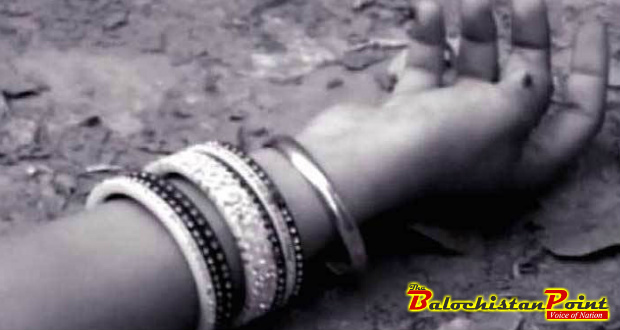Mariyam Suleman Baloch
The unborn child, unaware of the world, was expected to come after a month to the place where he would spend all his life. He yet didn’t have a single relationship with any human except for a relationship with his mother that too was merely limited to a feeling. A feeling that linked him with his expecting mother, Gul Pari, whom he never saw.
Before taking the last breath, what he heard was sound of bullets that riddled his mother and him. When he arrived to the place he was destined for, his little pinkish body was already torn apart. Did he ever know the murderers were his uncles?
The little harbor town of Pasni still remembers the arrival of Gul Pari from Bahrain after a long time when her husband himself left her at the Manama Airport. Her joy had no limits when she met her family members and in-laws in Pasni but never knew about a dark shift her life was about to take.
It might have been the darkest day of her life when her husband in Bahrain divorced her for no reason. The brothers of her husband walked toward her with guns and just within a few minutes in the name of honor killing, Gul Pari an expecting mother was riddled with six bullets, screaming with pain and less than 2% chances of survival. Her parents rushed her to Karachi where she took her last breaths with her eight months fetus.
This is merely one story; there are hundreds of stories that tell dark sides of customs and traditions that are against humanity. Young women in such societies often find their lives confined with social restrictions but rarely this matter is discussed. It doesn’t mean that when something is not often discussed, that doesn’t exist. By this we mean that social norms, traditions or customs which were created for women in particular, might have been immensely gratifying in the past but not in the twenty-first century.
Living in a downfall society of a third-world-country, talking about twenty-first century does not make a lot of sense, because we still follow the same social structure, customs and traditions. Life still is same for more than 70% of Balochistan as it was in twentieth or nineteenth century, but still what can’t be disregarded are the young minds that think different today.
The tradition of Honor Killing has been one of the leading causes for the destruction of a million young lives and minds in Balochistan from hundreds of years. The question rises that the lives of those young girls and women who yet had a long way to go and their minds that yet had to learn and envision thousands of possibilities didn’t possess any importance or just a right to say a word to defend themselves for the crimes often they didn’t even do?
Our society doesn’t only follow customs but religious practices as well. Not being totally aware of the Islamic teachings several people believe honor killing “an act of virtue”. They are similar to the people who wear glasses with incorrect prescription. In the result they can’t exactly see what actually is out there and keep presenting inaccurate assumptions. They disregard the fact that a custom that kills does not make sense to any religion instead Islam or any other religion will teach forgiveness and a second chance.
Now taking a stand against a custom that kills would be recognized as a great act in the world but not that uncomplicated in most parts of the world where customs and traditional laws more powerful than the constitutional laws of that country.
To end the cycle of this inhume custom, thousands of young minds will have to take stand. All it needs is courage and a few steps to educate and empower the women along with educating the men who take their honor seriously granted and often violate the laws with bravery. Having said this, it is the responsibility of the government not only to make laws but to make them strong enough to be followed.
Note: Names of persons and places have been changed for privacy reasons.
Published in The Balochistan Point on October 7, 2015
Disclaimer: Views expressed in this article are those of the author and The Balochistan Point not necessarily agrees with them.
 Balochistan Point Voice of Nation
Balochistan Point Voice of Nation




